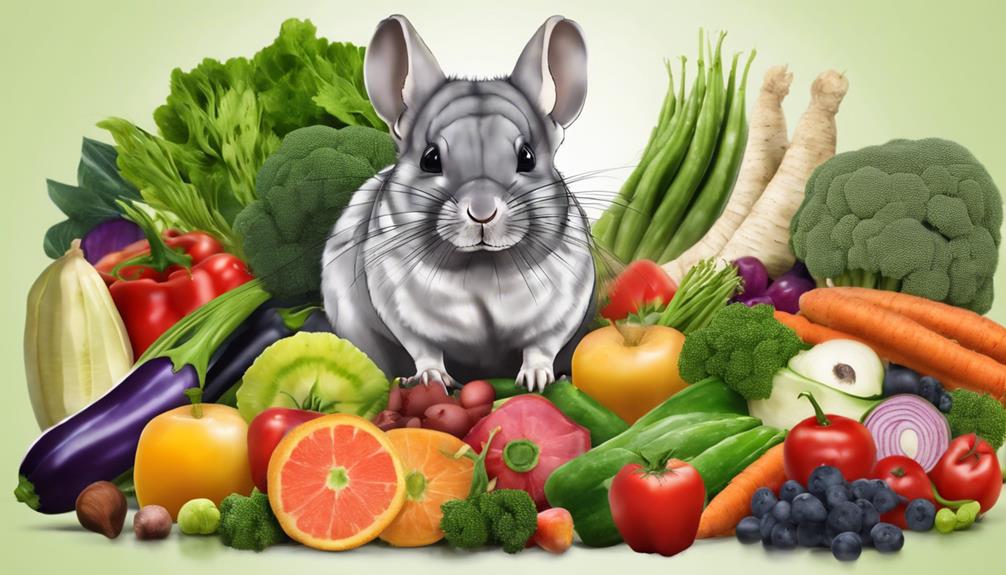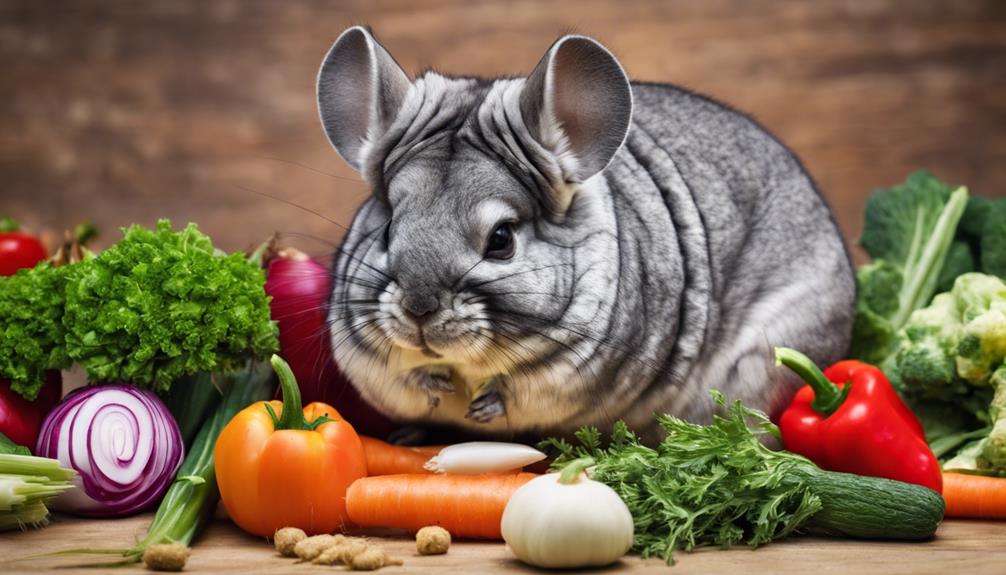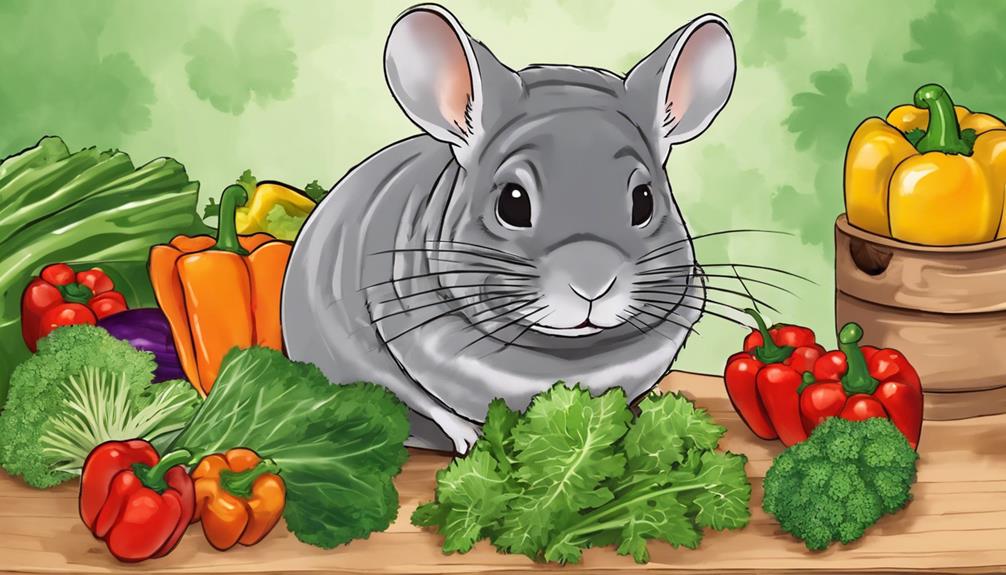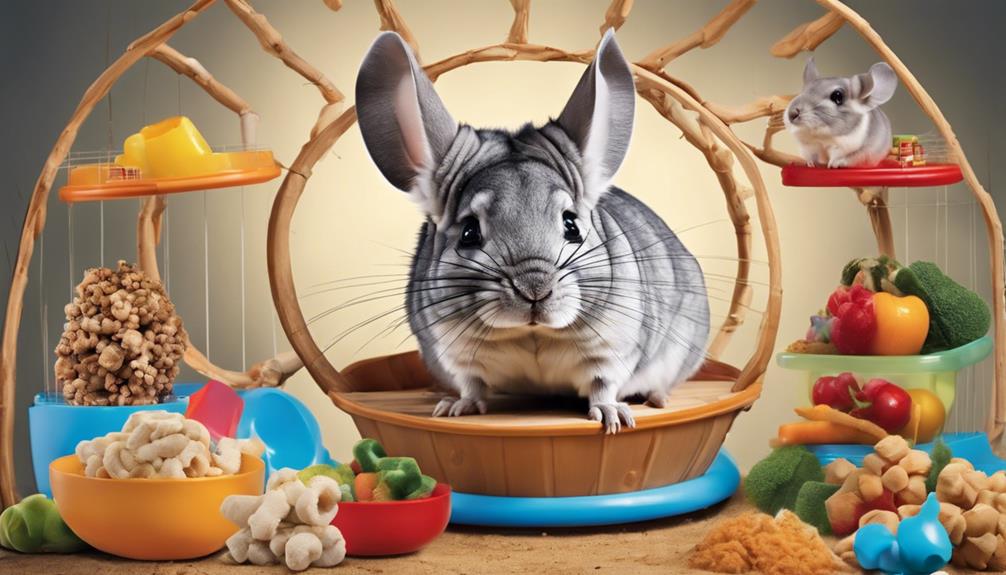What to Do to Prevent Obesity in Chinchillas Through Diet

Chinchillas are adorable and active pets that require a balanced diet to stay healthy. Preventing obesity in chinchillas involves careful attention to their diet and exercise routine. To maintain a healthy weight, chinchillas should be fed a diet that is high in fiber and low in fats and sugars. Providing them with fresh hay, pellets, and limited treats is essential for their well-being. Additionally, regular exercise in a safe environment is crucial to help chinchillas stay fit and active. By following these key steps, chinchilla owners can ensure their pets lead a healthy and happy life.
Obesity in chinchillas can lead to various health issues, such as diabetes and heart disease. Therefore, it is important to monitor their diet and activity levels closely to prevent them from becoming overweight. Owners should consult with a veterinarian or a chinchilla specialist for guidance on the best diet and exercise plan for their pets. With proper care and attention, chinchillas can live a long and healthy life.
Understanding Chinchilla Dietary Needs
Understanding the intricate dietary requirements of chinchillas is paramount in ensuring their health and well-being. Chinchillas, delicate creatures that they are, have specific needs when it comes to nutrition. One important aspect to bear in mind is their protein requirements. Adequate protein in their diet is essential for maintaining their overall health and supporting essential bodily functions. However, it's imperative to strike a balance as excessive protein intake can lead to health issues.
Equally significant is the consideration of calcium balance in chinchilla diets. Calcium plays a crucial role in maintaining strong bones and teeth, but an imbalance can result in various health complications, such as bladder stones. Providing a diet that meets their calcium needs without tipping the scale is a delicate art that must be mastered by those dedicated to the care of these charming creatures.
Providing High-Quality Hay
Ensuring the provision of high-quality hay is a fundamental cornerstone in meeting the dietary needs of chinchillas and promoting their overall well-being. Quality hay plays an essential role in maintaining proper digestion, dental health, and mental stimulation for your chinchilla.
Here are some key points to take into account:
- Hay quality, importance: Opt for fresh, green hay with a sweet aroma and soft texture. High-quality hay is vital in fiber, essential for chinchillas' digestive health and dental wear. It also helps prevent obesity by promoting a healthy weight and reducing the risk of gastrointestinal issues.
- Hay variety, benefits: Offering a variety of hays such as timothy, orchard grass, or meadow hay can provide different textures and flavors, keeping your chinchilla engaged and interested in their diet. Each type of hay offers unique nutritional benefits, ensuring a well-rounded diet for your furry friend.
Limiting Commercial Treats

Limiting commercial treats is pivotal in maintaining your chinchilla's weight and overall health. By controlling the frequency of treats, you can prevent excessive calorie intake that leads to obesity.
Opt for healthy treat alternatives that offer both enjoyment and nutritional value to support your chinchilla's well-being.
Treat Frequency Control
To maintain a healthy weight in your chinchilla, moderation is key when it comes to offering commercial treats. Remember, balancing treat portioning with nutrient needs is vital for weight management.
Here are some essential tips for controlling treat frequency:
- Control Portions: Offer treats in small, appropriate portions to avoid overfeeding and unnecessary weight gain.
- Reward Variety: Rotate different types of treats to provide a diverse range of nutrients and prevent diet monotony.
- Monitor Intake: Keep track of how many commercial treats your chinchilla consumes each day to make sure they remain a small part of their diet.
Healthy Treat Alternatives
Controlling the frequency of commercial treats guarantees a balanced diet for your chinchilla; now, consider incorporating healthy treat alternatives to further improve their nutrition.
Fruit substitutions can be a delightful and nutritious option for your chinchilla. Instead of sugary commercial treats, offer small portions of chinchilla-safe fruits like apples, pears, or blueberries. These fruits provide essential vitamins and minerals while satisfying your pet's taste buds.
Additionally, homemade snacks can be a fantastic alternative to store-bought treats. You can create simple treats using chinchilla-safe ingredients like hay, oats, or a small amount of dried fruits.
Nutritional Value Consideration
Consider the nutritional value of the treats you feed your chinchilla to guarantee their diet supports peak health and well-being. When choosing treats, opt for those that align with their protein sources and fiber requirements. Remember, moderation is key to maintaining a balanced diet for your furry friend.
- Protein Sources: Select treats that provide essential proteins to support muscle growth and overall health.
- Fiber Requirements: Make sure that the treats you choose are rich in fiber to promote proper digestion and prevent gastrointestinal issues.
- Moderation: Limit the intake of commercial treats to maintain a healthy weight and prevent obesity in your chinchilla.
Offering Fresh Vegetables in Moderation

When incorporating fresh vegetables into your chinchilla's diet, remember to do so in moderation to maintain peak health and nutrition. By offering a variety of vegetables in controlled portions, you provide essential nutrients while preventing the risk of obesity. Vegetable variety guarantees a well-rounded diet, offering different vitamins and minerals that support overall well-being. However, it's essential to exercise portion control to avoid overfeeding, which can lead to weight issues in chinchillas.
Fresh vegetables are a delightful addition to your chinchilla's diet, but moderation is key. Aim to offer a small amount of fresh vegetables a few times a week, alongside their regular hay and pellets. Remember, chinchillas have sensitive digestive systems, so introducing new vegetables slowly is advisable to prevent any gastrointestinal upsets. By balancing vegetable variety and portion control, you can promote a healthy weight and lifestyle for your cherished chinchilla.
Monitoring Pellet Intake
To maintain peak health and prevent obesity in your chinchilla, closely monitoring their pellet intake is paramount. Chinchillas have specific dietary needs, and regulating their pellet consumption is critical in ensuring they stay healthy and fit. Here are some key points to bear in mind when monitoring your chinchilla's pellet intake:
- Pellet portioning: Properly portioning out your chinchilla's pellets according to their size, age, and activity level is essential. Avoid overfeeding as excess pellets can lead to weight gain and health issues.
- Eating behavior: Pay close attention to your chinchilla's eating habits. Monitor how much they consume daily and look for any sudden changes in appetite, which could indicate underlying health concerns.
- Consistency is key: Establish a feeding routine and stick to it. Regular feeding times help regulate your chinchilla's appetite and prevent them from overeating.
Ensuring Adequate Exercise Opportunities

Are you providing ample opportunities for your chinchilla to engage in physical activity and exercise regularly to maintain their health and prevent obesity? Ensuring your chinchilla has a well-thought-out playtime schedule is essential. Dedicate time each day to interact with your pet outside of their cage, allowing them to stretch their legs and explore a safe, chinchilla-proof area. Encouraging activities like supervised play with chinchilla-safe toys or setting up obstacle courses can keep them active and mentally stimulated.
Additionally, the setup of your chinchilla's cage plays a significant role in promoting exercise. Create a multi-level environment with platforms, ramps, and shelves for climbing and jumping. Include exercise wheels specifically designed for chinchillas to provide an outlet for physical activity even when they're in their enclosure. Make sure that the cage is spacious enough to allow for movement and exploration.
Consulting With a Vet Regularly
Regular consultations with a veterinarian are imperative to safeguarding your chinchilla's health and well-being, ensuring early detection of any potential issues and providing tailored guidance for their care. Your chinchilla's nutrition and weight management are vital aspects of their overall health, and a vet can offer valuable insights to help you navigate these areas effectively.
- Weight Management: Vets can assess your chinchilla's weight regularly, helping you maintain a healthy balance and prevent obesity, which can lead to various health problems.
- Nutritional Balance: Ensuring your chinchilla receives a well-balanced diet is essential. Vets can recommend appropriate foods and supplements to meet their specific nutritional needs.
- Preventative Care: Regular check-ups with a vet can help identify any underlying health issues early on, allowing for prompt intervention and treatment, ultimately contributing to your chinchilla's long-term well-being.
Frequently Asked Questions
Can Chinchillas Eat Fruits as Part of Their Diet?
Yes, chinchillas can eat fruits, but with restrictions. Guarantee nutritional balance by limiting sugary fruits. Focus on their dietary requirements to prevent obesity. Moderation is key to maintaining their health and well-being.
How Often Should Chinchillas Be Given Access to Chew Toys to Help With Dental Health?
As you tend to the vibrant garden of your chinchilla's dental health, providing access to enrichment toys is akin to watering the soil of their well-being. Encourage daily chewing for strong teeth and balanced dental wear.
Are There Any Specific Brands of Chinchilla Pellets That Are Recommended for Preventing Obesity?
To prevent obesity in chinchillas, focus on quality pellet options rich in essential nutrients. Consider brands like Oxbow or Mazuri. Supplement with hay, fresh veggies, and controlled portions. Prioritize your chinchilla's health with balanced meals.
Can Chinchillas Safely Consume Herbs as Part of Their Diet?
Chinchillas can safely consume herbs as part of their diet. Herbal supplements, when balanced carefully, can be beneficial. Ascertain the safety of any herbal remedies by consulting a veterinarian. Maintain dietary balance for healthy chinchillas.
What Are Some Common Signs That a Chinchilla May Be Overweight and in Need of a Diet Adjustment?
To determine if your chinchilla is overweight, observe signs like reduced activity, difficulty grooming, or a lack of energy. Start with gentle exercise routines, monitor weight, control portions, and offer healthy treats to maintain peak health.











